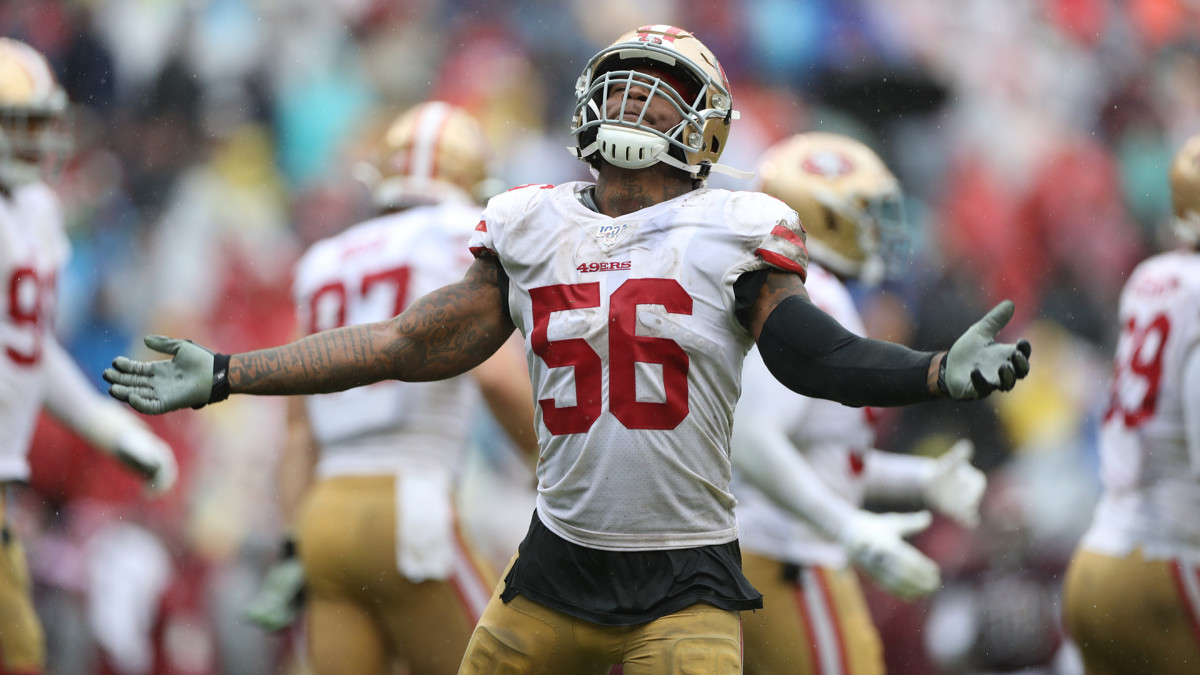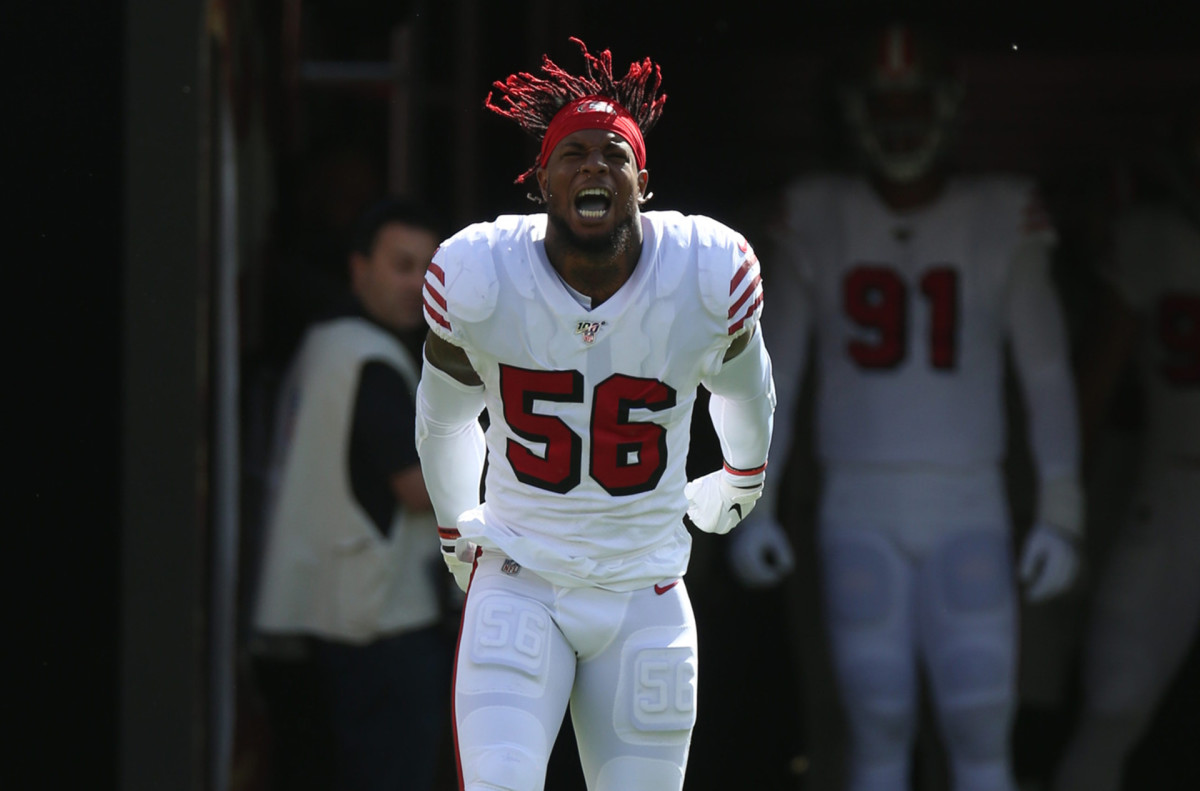Kwon Alexander’s ‘Legendary’ Return

MIAMI — Shortly after 49ers linebacker Kwon Alexander suffered a torn pectoral muscle in Week 9 at Arizona, his mother, Peaches Taylor, had a vision of sorts. She says she saw the 49ers in Super Bowl LIV in February, and that she saw her son not only playing in the game but hoisting the Lombardi Trophy.
That seemed impossible when he got hurt, back on Halloween night. Normally, that type of injury would take up to six months to heal; an exceptionally healthy NFL player, bolstered by top doctors and state-of-the-art recovery methods, could maybe return in four months. Kwon Alexander? He was back in nine weeks, in time for the playoffs.
“Legendary,” he says.
That’s Alexander’s favorite word, his way of speaking his dreams into existence. For years, whenever anyone asked him how he was feeling, or what his plans were, he would simply answer, “greatness.” But as he climbed from a challenging upbringing in Alabama to a star linebacker at LSU all the way into the NFL, he decided “greatness” wasn’t enough. He needed something greater, something grander, and only legendary fit the bill.
“I feel legendary, always,” he says.

In many ways, Alexander embodies the 49ers ethos, in that he’s a character who is encouraged to be himself in a locker room filled with unabashed free spirits. A suitcase-sized orange boombox sits next to his locker, and he serves as the team deejay. Diamonds fill the bridge of his glasses. And he helped create the nickname for the linebacker core of the 49ers defense, Hot Boyzz, which he splashed on sweatshirts that are now sought throughout the locker room. He says things like, “We stay hot all the time” and, “The block is hot.” He’s not wrong.
“That’s Kwon,” says pass rusher Dee Ford. “Any time you ask him how he’s doing, he’s legendary. He literally lives life as, like, he’s trying to be remembered. To me, football is an art form; I feel like sports are an art form. Your tape is your art, you know what I’m saying? And if it’s good, they’ll remember it forever.”
Kyle Shanahan, encourages players like Alexander to be exactly who they are. He argues that they can’t be their best selves if they’re not being their true selves, a philosophy that might not play as well in places like New England. Shanahan recently told reporters that wideout Kendrick Bourne reminds him of his 10-year-old son. He meant that as a compliment, meant that Bourne is upbeat, unruffled. “I bet you that's exactly how he woke up out of bed today when he probably ate Fruit Loops and watched cartoons,” he told reporters. “The guy is just the same all the time.”
Alexander came to his positivity the hard way. He describes his childhood in Oxford, Alabama, as filled with challenges, from the father who left when he was young, to watching his mom struggle, to all the athletes he knew who could ball like him but never made it out.
While playing for Tampa Bay from 2015-18, he also suffered a series of injuries. He only played all 16 games in one season (’16). Still, he managed 380 tackles, while grabbing six interceptions and forcing six fumbles.

The injuries weren’t even the worst part. His younger brother, Broderick Taylor II, was murdered in November of Alexander’s rookie season, shot and killed after a fight. He was 17 years old, still in high school. (The man who shot him was sentenced to life in prison.) Before the game, Alexander struggled to breathe; he needed an oxygen mask to even step onto the field. Alexander played the next weekend anyway, registering 11 tackles and two turnovers, earning the NFC’s defensive player of the week award. He had angel wings tattooed on his back. “I think about my brother every day,” he says. “I talk to him every day. That’s my guy, man. When I get away from everything, I know he won’t judge me. That’s my dog.”
After losing his brother and fighting back to full health, Alexander made a promise to himself. He would resume praying—a practice he had stopped—think positive, make legendary into a reality.
In free agency last spring, where some teams saw an injury-prone linebacker who missed too many tackles, the 49ers saw a potential centerpiece for their rebuilt defense, after they had set an NFL record for fewest takeaways (seven) the season before. Cornerback Richard Sherman was back to full health after suffering a torn Achilles in 2017. Dee Ford was signed to bolster the pass rush, and San Francisco parlayed an injury to quarterback Jimmy Garoppolo in 2018, and the high draft pick from a lost season, into Nick Bosa, who they took with the second overall pick. Tampa Bay wanted to bring Alexander back, but not at the price the 49ers offered: four years, $54 million, $14.25 million guaranteed.
The fit was perfect. Alexander became the team leader in energy dispensed and number of laughs drawn from teammates. He attacked his injury rehab the same way, under the 49ers newly bolstered performance team. San Francisco uses some 30 specialists to help their players train, gain strength and recover. They focus on everything from injury rehab to nutrition to psychology. The program is so comprehensive that before the season opener, at Tampa, the performance folks built a sauna-like tent in the middle of the practice field, where the players rode 25 stationary bikes in high heat to acclimate to warmer weather. Then the 49ers stomped on Alexander’s old team, winning 31-17, en route to an 8-0 start.
Every player has a customized protocol or program in place that changes based on how they feel throughout the season. And while any NFL team that largely avoids long-term or major injuries encounters some luck, San Francisco will head into the Super Bowl against the Chiefs with 23 of 24 starters from the season (counting specialists) healthy enough to play.
That includes Alexander, who says his brother will be with him. “We’re going to the Super Bowl,” he says. “I mean, ‘we.’ He’s going to be right there with me every step. It’s crazy. I wish he was right here with me, and he could really live it out. But I know he’s up there living with me.
“Everybody here loves the game, so I know that moment’s coming where we’re going to finish it. That’s when I’ll be able to say that’s one of the most legendary things I’ve ever done.”
• Question or comment? Email us at talkback@themmqb.com.
